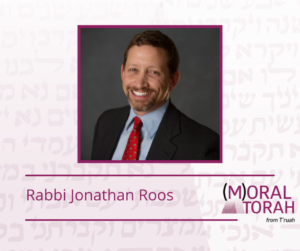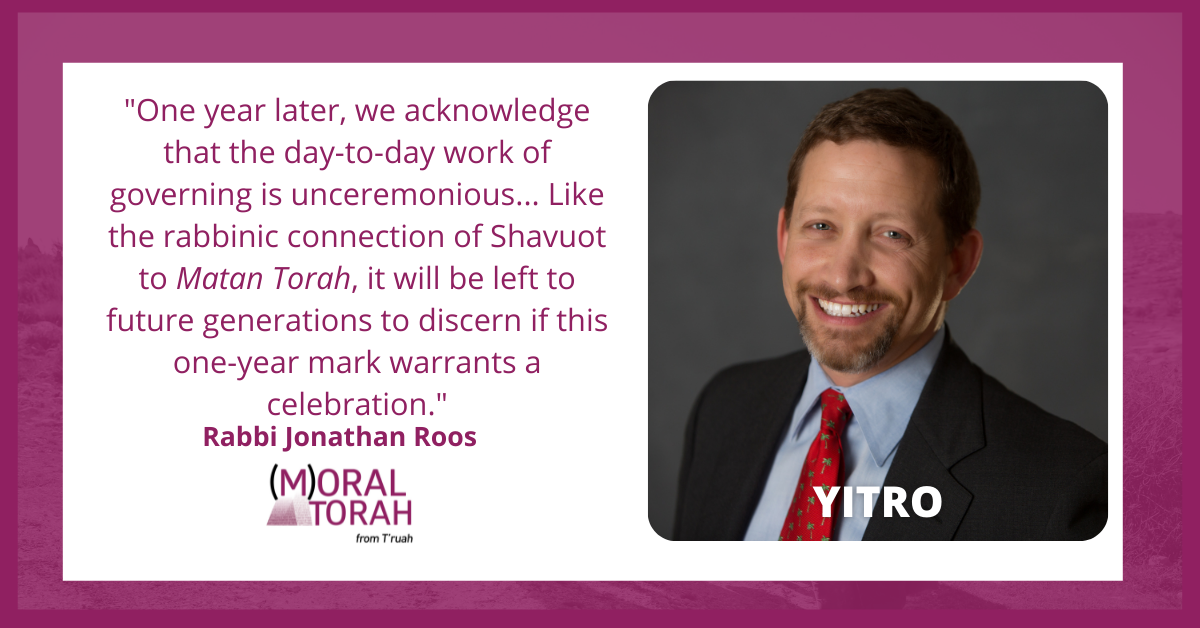A D’var Torah for Parshat Yitro by Rabbi Jonathan Roos
This week marks one year since President Biden’s inauguration and is a time to reflect on how well we have lived up to the optimism of that day. To guide our reflection, let us compare the weekly Torah portions from last year to this year. The inauguration fell during the week of Parshat Bo; this year, January 20 is the week of Yitro.
These parshiyot contain two of the most significant events in Jewish history: the Exodus from Egypt and Matan Torah (the giving of Torah). Each event has a holiday associated with it – Passover for the Exodus and Shavuot for the giving of Torah. The institution of those holidays, however, could not be more different.
Bo includes the final plagues and the deliverance from slavery. Amidst the drama of that final day in Egypt, Moses commands the Israelites to mark the occasion with Passover “as a festival to the ETERNAL throughout the ages” (Exodus 12:14). The holiday and its rituals occupy nearly 40 verses of the parshah. Those verses in Bo feel inauguration-worthy in their sense of the historical importance of the moment, the emphasis on rituals, and the attention to details.
Sign up to receive (M)oral Torah in your inbox each week.
Yitro, the parshah describing Matan Torah, curiously does not institute a festival or any mitzvot to mark the occasion. In fact, nowhere in the Torah do we find rituals to commemorate the revelation at Sinai. Shavuot in the Bible is an agricultural holiday, and its connection to Matan Torah is not established until much later, in the teachings of the Talmud (BT Shabbat 86b).
Here the analogy between the Torah portions and their corresponding presidential moments offers a lesson. Like Passover in Parshat Bo, the pomp and ritual of an inauguration is part of its essence from the outset. Lady Gaga singing the national anthem into a gold microphone, for example, is orchestrated to create a lasting impression that magnifies the President and his message. So when President Biden takes the podium and identifies challenges ahead — “The cry for survival [that] comes from the planet itself,… political extremism, white supremacy, domestic terrorism that we must confront and we will defeat” — we are primed to pay closer attention.
One year later, we acknowledge that the day-to-day work of governing is unceremonious. Righting past wrongs is not a singular event but a process that requires constant attention, and the significance of this first year is unclear in the moment. Like the rabbinic connection of Shavuot to Matan Torah, it will be left to future generations to discern if this one-year mark warrants a celebration.
Find more commentaries on Yitro.
The Torah’s ambiguity about the exact date on which we stood at Sinai is analogous to the lack of clarity around measuring whether we have “confronted and defeated” the injustices and crises before us. Exodus 19:1 says, “On the third new moon… on this day (bayom ha-zeh), they came to the Sinai wilderness.” Rashi, quoting midrash, unpacks the message:
The verse should have been written “bayom ha-hu, on THAT day.” Why does it say, “bayom ha-zeh — THIS day?” This comes to teach us that the words of Torah should be considered as though they are new to you each day.
The difference between THAT day and THIS day is the difference between a singular event, like an inauguration, and the ongoing process of working daily to achieve the high goals elucidated in the ceremonial moment.
 A year ago, the work of pursuing justice needed a fresh start in the spirit of Bo and its announcement of Passover. We will succeed today in repairing the world only if we stay in the spirit of Yitro’s “bayom ha-zeh” and make the sacred work an ongoing pursuit for tomorrow and each day thereafter. With that kind of tenacity, we may live up to the words Amanda Gorman shared last year: “If we merge mercy with might, and might with right, then love becomes our legacy and change our children’s birthright. So let us leave behind a country better than the one we were left with.” (Gorman, “The Hill We Climb”)
A year ago, the work of pursuing justice needed a fresh start in the spirit of Bo and its announcement of Passover. We will succeed today in repairing the world only if we stay in the spirit of Yitro’s “bayom ha-zeh” and make the sacred work an ongoing pursuit for tomorrow and each day thereafter. With that kind of tenacity, we may live up to the words Amanda Gorman shared last year: “If we merge mercy with might, and might with right, then love becomes our legacy and change our children’s birthright. So let us leave behind a country better than the one we were left with.” (Gorman, “The Hill We Climb”)
Rabbi Jonathan Roos is the senior rabbi of Temple Sinai in Washington, DC. He was ordained in 2002 from the Hebrew Union College – Jewish Institute of Religion.

